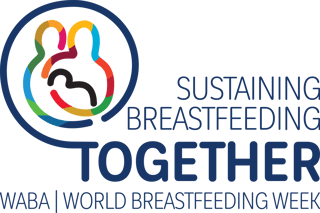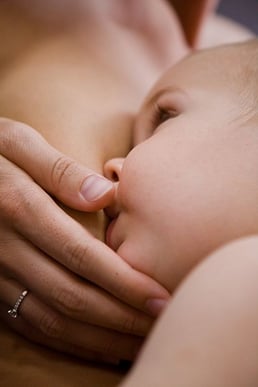- Privacy Policy
- Terms & Conditions
- Contact us
- ©Isabel Healthcare 2020
World Breastfeeding Week | 10 Amazing Fact About Breastfeeding
 August is National Breastfeeding Month in the US, and the 1-7th August brings about World Breastfeeding Week, where countries around the world raise awareness about breastfeeding and the ways in which it can be championed in all societies globally. In many countries, breastfeeding is still a taboo, whilst in others it is the only way for a mother to ensure her baby gets the nutrition it needs. Malnutrition of the mother can lead to difficulties with this, especially in underdeveloped countries, so Breastfeeding Month and Week helps to solve these issues and break down social barriers. In developed countries as well, there is still a lot to be done to remove the stigmas around public breastfeeding and support mothers who choose to breastfeed or not. This year is the 25th World Breastfeeding Week, and the focus is on coming together with a shared goal, and understanding the role you can play in promoting breastfeeding in society. For example, if you own an establishment like a cafe or office, simply providing an area for breastfeeding or voicing your support for the activity in your building, can make the world of difference to a mother with a hungry child.
August is National Breastfeeding Month in the US, and the 1-7th August brings about World Breastfeeding Week, where countries around the world raise awareness about breastfeeding and the ways in which it can be championed in all societies globally. In many countries, breastfeeding is still a taboo, whilst in others it is the only way for a mother to ensure her baby gets the nutrition it needs. Malnutrition of the mother can lead to difficulties with this, especially in underdeveloped countries, so Breastfeeding Month and Week helps to solve these issues and break down social barriers. In developed countries as well, there is still a lot to be done to remove the stigmas around public breastfeeding and support mothers who choose to breastfeed or not. This year is the 25th World Breastfeeding Week, and the focus is on coming together with a shared goal, and understanding the role you can play in promoting breastfeeding in society. For example, if you own an establishment like a cafe or office, simply providing an area for breastfeeding or voicing your support for the activity in your building, can make the world of difference to a mother with a hungry child.
To do our part this World Breastfeeding Week, we have put together 10 facts that show us how amazing the connection between mother and baby is, and how natural it should be for this to happen in our societies.
10 Amazing Facts about Breastfeeding
1.Your body knows what to do
Every step of the way. From the moment you conceive a child, your body is preparing for what is to come, and this includes preparing for breastfeeding. As most people know, your breasts become larger during pregnancy, and this is due to a change from normal breast tissue to milk producing cells. From then on, your body starts producing the first milk needed when your baby is born, known as colostrum, and the hormones and brain signals needed to kickstart the feeding process are released when your baby is born, and with skin to skin contact. There is no physical preparation needed, other than staying as healthy as possible and avoiding too much alcohol or foods and medications that may not be suitable.
2. Your breastmilk helps keep your baby healthy
All breast milk contains nutrients and antibodies needed to help keep your baby healthy, and boost the immune system. When first born, and during the first few days of their life, your baby will receive ‘colostrum’ when breastfeeding. This contains a huge amount of antibodies, as well as helping the baby adjust to using a digestive system. Think of colostrum as a first, natural vaccine for the real world, away from the womb.
3. Your breast milk is tailored to your baby or babies
Colostrum is very clever in that it is made specifically for the health of a newborn baby. However, it doesn’t stop there. From then on, every individual feed will be personally tailored to your baby, and the chemical make-up of the milk will change as the baby grows and requires different nutrients or calorific value. Milk can even contain more or less water, depending on the temperature and how dehydrated the baby could potentially become.
4. Breast milk changes throughout a feed
It doesn’t stop at tailored milk. Every single feed has a process in which the milk produced changes throughout. Milk at the beginning of a feed tends to be thinner and more watery, in order to quench the initial thirst. Then, as they get used to the feed and are no longer as thirsty, the milk becomes thicker with a higher fat content, to deliver the vital calories and nutrients.

5. Breastfeeding helps the postpartum process
Breastfeeding has many benefits for your baby, but it is also a key part of the mother’s recovery and wellbeing following pregnancy. Post-partum recovery, including returning to pre-pregnancy weight, as well as the uterus and surrounding muscles returning to normal, can all be helped by the process of breastfeeding. This is because hormones are released telling the body that the pregnancy and birth has been successful, and the ‘baby weight’ and uterus are no longer needed right now. What’s more, energy required to produce milk and feed a baby takes on average around 1000 calories. Mothers are recommended to take on 500 extra calories than normal when breasfeeding, and this still leaves a deficit to allow weight to return to pre-pregnancy levels.
6. There is a chemical and hormonal change in the mother when breastfeeding
The hormones oxytocin and prolactin are both released during a feed, and these help keep the body producing the milk it needs for your baby. However, these hormones also promote a content and happy emotional state in the mother, which in turn calms both mother and baby, and helps with the bonding process.7. Babies bond better when breastfeeding
Due to the calming nature of breastfeeding, both because of the hormonal changes in mother and because of the soothing taste or sensation of drinking milk, babies enjoy the process of breastfeeding as much, if not more, than their mother. The skin to skin contact helps mother and baby to regulate their temperature, whilst the closeness to the mother’s face helps cement that face as an important one. Did you know that until around five months old, your baby can only see around 8-10 inches in front of their eyes? This is also the same sort of distance between you breast and your face, meaning your baby is able to see your face and bond with your further during a feeding session.8. Fathers can benefit from breastfeeding too
Many fathers are apprehensive of feeling left out or unhelpful during feeding times, as they are unable to provide the milk the baby’s mother can. However, partners are just as necessary in supporting the feeding process, and indeed the entire job of caring for a new baby, as the mother. Helping to make the mother comfortable, sitting with the mother and baby during a feed in order to join in the bonding process, and helping burp and sooth a baby to sleep after a feed are all crucial moments where you too can get involved.9. Your baby can taste what you have eaten
Although not directly, the taste of your milk will change slightly depending on your own diet, and this allows the baby to start getting used to different tastes, in preparation for solid foods.10. Breast milk can heal
The milk your breasts produce contains elements to both fight infection and act as an anti-inflammatory. This helps keep your nipples as comfortable and healthy as possible, although it can still sometimes be a struggle for the first few weeks! If you find your breasts are particularly tender, swollen or in pain, using a small amount of breastmilk as an ointment can sooth and heal your breasts.The human body is an amazing and highly evolved part of our world, and breastfeeding is one of the most impressive feats of the female body, along with pregnancy and birth. This completely natural process happens with very little, if any, human intervention other than parents and baby, and that is a truly fascinating thing. Spread the word about the wonders of breastfeeding this World Breastfeeding week and month, by telling someone about some of the facts in this post. You can also help spread awareness of ending the stigma on breastfeeding and helping society to embrace this natural process as part of every day life.
Subscribe to the Isabel Healthcare Blog. We upload every week with updates on everything to do with your health and the healthcare industry.
Subscribe Here!
Recent Posts
Virtual Triage: Do more questions lead to better patient outcomes?
One of the common misconceptions related to virtual triage / symptom checker tools is that the more..Webinar: Using Virtual Triage To Transform Patient Access
Outdated contact centers are posing problems for today's health systems. As longer hold times..List Of Categories
- Differential Diagnosis Decision Support
- Differential diagnosis
- Symptom Checker
- Symptoms
- Medical Error
- Patient Disease Information
- Disease
- Diagnostic Decision Support
- Clinical Decision Support
- Isabel 1 Minute Read
- Diagnosis Error
- Diagnosis Skills Cases
- Healthcare Informatics
- Medical Education
- Patient Engagement
- Clinical Reasoning
- Evidence-based Medicine
- Symptom Triage
- Nurse Practitioner Education
- Nursing Decision Support
- Partnership
- Public Health
- COVID-19
- EHR
- Patient Empowerment
- Patient Safety
- rare disease

Start your FREE Trial today
Try the Isabel Pro DDx generator for 30-days - no payment card details required.




